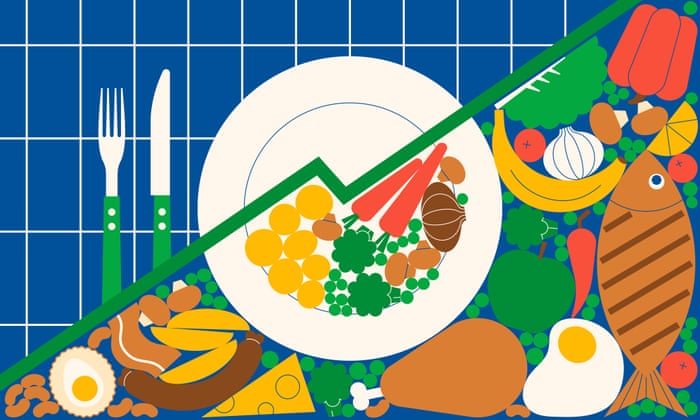Our health is so often measured in figures; whether it’s a number on the scales, a score on our blood pressure monitor or our body mass index. With such a focus on personal responsibility, these metrics often only succeed in making people feel bad about themselves.
Thankfully, the tide is turning, and more people are realising that an environment which encourages the over-consumption of unhealthy convenience foods is a major contributing factor to poor health. Overcoming this requires more support than the individualistic approach would have us believe.
As the UK’s largest food retailer, Tesco is very aware of this challenge, and has some positive numbers to share. Since 2018, Tesco has removed 71bn calories (pdf) from its own-brand ranges through reformulation, and 325 tonnes of sugar from its own-brand cereals.
But Laura Farrell, Tesco’s company nutritionist, says good health is about so much more than numbers and statistics. “My job is to consider what constitutes the foundations of a good diet, and how that can manifest in different products, information and initiatives,” she says. “A lot of that is forming insight into our Better Baskets campaign, the aim of which is to make it easier for shoppers to fill baskets with better choices for their health.”
Informed by the NHS’s Eatwell Guide, this makes it simple for customers to see the healthiest choices at a glance. “For example, in the cereal aisle, you will see the products that are higher in fibre and lower in sugar.”
As well as Better Baskets, there is the Fresh 5 initiative to encourage shoppers to try a variety of seasonal fruit and vegetables, with recipe inspiration in Tesco magazine and at realfood.tesco.com. Elsewhere, Tesco has partnered with Groundwork, a federation of independent charities, to create a £5.3m grant programme called Stronger Starts. The goal is to help 1 million children by funding healthy food and fitness activities to improve their physical health and mental wellbeing – from breakfast clubs and playground equipment, to football kits and gardening classes.
This is more important than ever as obesity, and obesity-related conditions, now cost the NHS around £6.5bn a year. And it’s starting younger than ever before; a shocking 36.6% of English children are an unhealthy weight according to the latest figures. Making it easier for busy parents to improve their children’s health has never been more crucial, and this is where Tesco’s reformulation of own-brand products comes into play.
“When it comes to reformulation, we’re reducing things like saturated fat, salt and sugar in our products,” says Farrell. “But also we’re looking for the opportunities to increase the good stuff that we should be getting more of, such as fibre, fruit and vegetables. By doing that, we’ll be getting more micronutrients and beneficial bioactive compounds in there as well.”
Tesco is signed up to the Food Foundation’s Peas Please pledge, which aims to make it easier for everyone in the UK to eat more vegetables, and as a result has committed to adding more portions of veg into its ready meals across the board. “Their manifesto has been really helpful to communicate with our suppliers, our technical teams and our development teams,” says Farrell. “It’s quite a straightforward one because, if somebody’s buying a ready meal, it’s a convenient solution where they get everything in one package. So making sure that we’re getting at least one portion of vegetables in there is a really positive thing.”
With only one-third of UK adults meeting the recommended five portions of fruit and veg a day, it’s no small feat that 52% of Tesco’s own-brand ready meals now contain at least one of your five-a-day.
Farrell says it’s a delicate balance between making the meal as healthy as possible, while ensuring it’s still delicious. “If we create a product that isn’t tasty, people won’t pick that product up,” she says. “They might instead choose a product that’s not as healthy. Then we’ve failed.”
Tesco caters to a very broad range of customers. There are those for whom healthy eating is not really on their radar, and at the other end are the shoppers who are better informed and have a clear focus on healthy living. Certain shopping trends in Tesco reflect this. Tesco has seen a huge surge in sales of kombucha, for instance, which is now part of its meal deal, and low/no-alcohol drinks in general. It’s one of many shifts that show how consumers are choosing healthier options where they can.
Then there are the customers who would love to be healthier, but time and money are barriers. “We do hear from customers that they perceive healthy food to be more costly,” says Farrell. “So for people who are reliant on ready meals, we’ve been working to ensure they are as healthy and affordable as possible. And for our customers who are scratch cooks, we’ve got our Aldi price match that includes lots of fruits, vegetables and healthy carbohydrates, so people can build up a healthy diet.”
As for the future, Tesco’s goal is to increase the proportion of sales from healthier products to 65% by 2025, and it’s on track to achieve it.
The brand has shown what can be possible when those who shape our food landscape take responsibility and progressive action to put healthy and affordable food on everyone’s plate. There is no excuse for other industry decision makers not to do the same.
Find out more about how Tesco is working to improve the health of the nation at tesco.com/better-baskets







